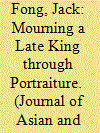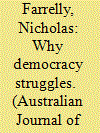| Srl | Item |
| 1 |
ID:
164384


|
|
|
|
|
| Summary/Abstract |
This article employs an urban sociological reading to examine mourning portraiture in the primate city of Bangkok, Thailand, following the death of King Bhumibol Adulyadej (Rama IX). The article argues that Bangkok’s mourning portraiture constructs a reified notion of the Thai nation acceptable to Bangkok’s elites. Through a narrative that sacralizes the late king’s historical exploits for the Thai people, Bangkok’s elites have harnessed the affluent shopping district of Pathum Wan as an aesthetic and political canvas for showcasing the transcendent and virtuous nature of their late monarch. With mourning portraiture as figure and Bangkok’s Pathum Wan as background, the nationalist implications of the imagery as they render sacred the late monarch are considered. The article concludes that the capital city’s sacralization of a deceased king is but an attempt by pro-royalist banking families to reinforce their class linkages to the Thai aristocracy by ‘working towards the monarchy,’ a trajectory illuminated by Serhat Ünaldi, one which I hope to make visible in the post-death context of mourning Rama IX.
|
|
|
|
|
|
|
|
|
|
|
|
|
|
|
|
| 2 |
ID:
144657


|
|
|
|
|
| Summary/Abstract |
The concept of neo-royalism—being sacred, popular, and democratic—has served
as a formula of success during King Bhumibol Adulyadej’s long reign. However, in
the twilight of the Bhumibol era and with the obviously less able Crown Prince
Vajiralongkorn waiting to succeed, this concept poses a potentially dangerous trap
for the monarchy and its entire network.
|
|
|
|
|
|
|
|
|
|
|
|
|
|
|
|
| 3 |
ID:
121664


|
|
|
|
|
| Publication |
2013.
|
| Summary/Abstract |
Since the revolution of 1932 that ended absolute monarchy, Thailand has experienced sporadic military interventions, with 19 coups and coup attempts over those decades. This article explains these military interventions by emphasising the cultural aspects of Thai coup-making at the elite level. Concretely, the article shows that episodic military interventionism-supported by significant and persistent military influence in politics-is now part of a distinctive elite coup culture. In contrast to other so-called 'coup-prone' states, Thailand has largely accommodated military interventionism, especially by accepting the defence of the monarchy as a justification for toppling elected governments. Thailand's reluctance to redemocratise, and the haphazardness of the resulting institutional configurations, suggests that Thailand's elite-and, to some extent, the public as well-have deeply internalised the ultimate acceptability of coups. The test of this arrangement may come with the end of King Bhumibol Adulyadej's reign and the potential realignment of military influence in Thai society.
|
|
|
|
|
|
|
|
|
|
|
|
|
|
|
|